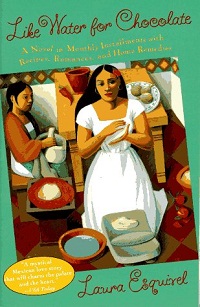Laura Esquivel: Like Water for Chocolate

If a distinction between typically masculine and feminine books is at all possible, then I'm sure that Like Water for Chocolate is a feminine novel. All the protagonists are women; the emotions and passions depicted in the novel are markedly feminine; and the frame of the story (women cooking dishes for all kinds of occasions, festive or otherwise) is rather „womanly”. (I hasten to add that I think this is an excellent novel, feminine or not, but I'd definitely be interested in the opinion of a male reader.)
The story is set during the Mexican Revolution, at the early 20th century. The main character is Tita, the youngest daughter in the de la Garza family – which consists solely of women. According to the family tradition, Tita isn't allowed to marry, and her fate is to take care of her mother right until her mother's death. Tita, at the age of fifteen, falls madly in love with Pedro, a young man living in the neighborhood, and since her feelings are reciprocated with equal passion, Pedro doesn't hesitate to ask for Tita's hand, despite the forbidding tradition. But Mama Elena – a tyrannical, brutal, overpowering woman who takes special delight in destroying, breaking and taking apart every object and emotion around her – doesn't let Tita marry Pedro. Instead, she offers her other daughter's, Rosaura's hand to Pedro, and he – just to be close to Tita – accepts the offer, and hopes that something may happen in the course of time.
Of course in the novel this isn't just a quiet, resigned kind of hope – on the contrary. The story is full of repressed emotions, pains and stormy passions, and when they become unbearable, they always get to the surface one way or the other. The characters use different methods to channel their tensions and feelings: Mama Elena, for instance, likes to tackle emotional crises with violence; while Tita's usual practice is putting her feelings right into the dishes she cooks.
I haven't mentioned this yet, so I mention it now: this is a magical realist novel (two books to which it bears a heavy resemblance are One Hundred Years of Solitude by Gabriel García Márquez, and Midnight's Children by Salman Rushdie), so here putting emotions into dishes is meant literally. Just an example: when Tita is ordered to make the wedding cake for Pedro's and Rosaura's wedding, she sheds her tears into the dough and the frosting. Due to her bitter tears, the cake tastes slightly different. But what's more important is that everyone who tastes the cake during the wedding is overcome with such intense unhappiness, painful longing and bitter nostalgia that the supposedly great and festive wedding comes to a disgraceful end.
By the way, the magical realism of the novel is of a strange kind, because here the realistic element is much more pronounced than in the case of the other two novels I mentioned, which, to me, seem much more magical and much less realistic. So besides the miraculous, impossible and heavily exaggerated details and elements (transmitting emotions through food; a sexual desire so intense that it cannot be quenched by an army of men; or the blanket sewn and embroidered by Tita which keeps getting bigger and bigger until it's huge enough to cover the whole ranch), you may also learn from this novel how to make safety-matches, and I'd assume that the recipes serving as the basis for the individual chapters are „real”, and you could safely cook these dishes.
And finally I mention what I should have mentioned right at the beginning, because this is my first, last and strongest impression of this novel: Like Water for Chocolate – with all its wonderful dishes, warm kitchen scent, and abundance in feminine furies and insatiable bodily desires – is an unbelievably sensual novel, both in the erotic and non-erotic sense of the word.
The story is set during the Mexican Revolution, at the early 20th century. The main character is Tita, the youngest daughter in the de la Garza family – which consists solely of women. According to the family tradition, Tita isn't allowed to marry, and her fate is to take care of her mother right until her mother's death. Tita, at the age of fifteen, falls madly in love with Pedro, a young man living in the neighborhood, and since her feelings are reciprocated with equal passion, Pedro doesn't hesitate to ask for Tita's hand, despite the forbidding tradition. But Mama Elena – a tyrannical, brutal, overpowering woman who takes special delight in destroying, breaking and taking apart every object and emotion around her – doesn't let Tita marry Pedro. Instead, she offers her other daughter's, Rosaura's hand to Pedro, and he – just to be close to Tita – accepts the offer, and hopes that something may happen in the course of time.
Of course in the novel this isn't just a quiet, resigned kind of hope – on the contrary. The story is full of repressed emotions, pains and stormy passions, and when they become unbearable, they always get to the surface one way or the other. The characters use different methods to channel their tensions and feelings: Mama Elena, for instance, likes to tackle emotional crises with violence; while Tita's usual practice is putting her feelings right into the dishes she cooks.
I haven't mentioned this yet, so I mention it now: this is a magical realist novel (two books to which it bears a heavy resemblance are One Hundred Years of Solitude by Gabriel García Márquez, and Midnight's Children by Salman Rushdie), so here putting emotions into dishes is meant literally. Just an example: when Tita is ordered to make the wedding cake for Pedro's and Rosaura's wedding, she sheds her tears into the dough and the frosting. Due to her bitter tears, the cake tastes slightly different. But what's more important is that everyone who tastes the cake during the wedding is overcome with such intense unhappiness, painful longing and bitter nostalgia that the supposedly great and festive wedding comes to a disgraceful end.
By the way, the magical realism of the novel is of a strange kind, because here the realistic element is much more pronounced than in the case of the other two novels I mentioned, which, to me, seem much more magical and much less realistic. So besides the miraculous, impossible and heavily exaggerated details and elements (transmitting emotions through food; a sexual desire so intense that it cannot be quenched by an army of men; or the blanket sewn and embroidered by Tita which keeps getting bigger and bigger until it's huge enough to cover the whole ranch), you may also learn from this novel how to make safety-matches, and I'd assume that the recipes serving as the basis for the individual chapters are „real”, and you could safely cook these dishes.
And finally I mention what I should have mentioned right at the beginning, because this is my first, last and strongest impression of this novel: Like Water for Chocolate – with all its wonderful dishes, warm kitchen scent, and abundance in feminine furies and insatiable bodily desires – is an unbelievably sensual novel, both in the erotic and non-erotic sense of the word.





